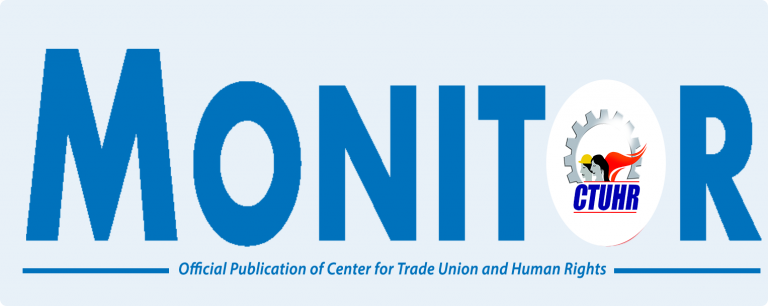CTUHR Statement on President Aquino’s State of the Nation Address 2014
Amid heightened public clamor for his impeachment and accountability for the Disbursement Acceleration Program, President Benigno Aquino III delivered his fifth State of the Nation Address last Monday, July 28, again trumpeting the exceptional economic growth, improved credit ratings, fiscal stability and good governance—all of which purportedly sets the foundation for an economic take off beyond his term in 2016. But realities of decreasing quality of work, alarming job losses, deepening poverty and a beleaguered leadership were not mentioned and unchecked.
Selective reporting: one side of the coin
To dispel mounting distrust on his leadership, Aquino selectively reported statistics to demonstrate that sustained economic growth in his last four years somehow trickled down: increased employment generation, lowered poverty rate, more budget for an expanded conditional cash transfer program among others. And the big majority cannot help but wonder, has the President made an effort to conduct a reality check or was the narration of glowing numbers deliberate to gloss over or temper mounting calls for his removal in office?
Take for instance, employment. After three successive years of decreasing number of jobs generated, Aquino reported a drastic leap in employment generation to 1.6 million in April 2014 surpassing the number of labor force entrants. But what was not mentioned was that in the same period, part time workers spiked to over 2.1 million while full time workers decreased by nearly 700,000. This means that the quality of jobs created declined. Further, this year alone, CTUHR monitored about 12,000 job losses in Metro Manila, Southern Tagalog and Surigao del Sur, due to factory closures and retrenchments. Thus, it is no surprise that unemployment rate remains high at 7.0% when compared to neighboring countries whose growth rates are way lower than the Philippines. Independent groups even estimate higher unemployment rate from 10% (Ibon Foundation) to as much as 25.7% (Social Weather Station).
In terms of poverty, the Aquino administration reported 2.5 million Filipinos lifted out of poverty in a span of only a year. But with poverty threshold set at P53.00 per day (1.2 USD) on the one hand and increasing prices of basic commodities on the other, anyone need not know economics to be able to calculate a decline in poverty rate from 27.9 percent to 24.9 percent. Mothers in Novaliches, Quezon City asked by CTUHR after the SONA, challenged the President and his cabinet to live by P53.00 day even for a day or two, before saying anything of this threshold. They added that those who attended the SoNA at the halls of Congress never understood poverty suffered by people, as their lives become harder under this government. The statement confirmed the SWS survey results released two days after the SoNA, that families who consider themselves poor increased to 12.1 million or 55%, from the 2013 average of 52%.
Aquino again proclaimed his administration’s commitment to inclusive growth citing increased spending for conditional cash transfer or 4Ps (Pantawid Pamilyang Pilipino Program) from P29 B in 2011 to 62 B in 2014. While claiming to have benefitted 4.3 million poor families, issues of (mis)identification of rightful beneficiaries as well as use for political patronage continue to hound CCT’s implementation. More importantly, CCT being a dole-out program is simply palliative way of addressing fundamental problems of unemployment, lack of livelihood, low wages, and costly social services. In fact, other lawmakers have called for its investigation, and even abolition, proposing that the fund could be better used in creating jobs so that the poor could regain their dignity than reducing them into beggars queuing for government alms.
All for business
The business community may be very well pleased to hear the fruits of the administration’s good governance—no new tax impositions (other than sin tax), ‘peaceful’ industrial relations, and more public-private partnership projects (PPP). All these achievements benefit the investor more than the poor, in fact, the PPP like that of the Vertis North of the Ayalas in the North Triangle in Quezon city, had taken over the land and displaced the poor. There may be no new taxes, .hikes in government fees and contributions abound exacting the poor more than the business. Food prices had almost doubled, premiums for social insurance (Phil Health and SSS) to rates of basic utilities (water, electricity, toll fees had gone up and mass rail transit fare hike is looming. Not only the water and electricity services and housing been privatized, but even public hospitals, which are becoming sources of profit for big businesses.
No strike? 20 victims of Extra-judicial killings
Aquino also congratulated Labor Secretary Rosalinda Baldoz for a job well done citing that out of 105 strike notices only one pushed through. The workers are not rejoicing, for the combined legal maneuver and shrewd employment practices by employers, like employment of flexible and contractual workers pre-empted them even to organize unions, so the strike, that can only be legally launched with a union will be difficult to happen. Workers’ defiance could not only manifest in strike, for despite the Aquino administration’s move to prevent workers protests and strikes by instituting the 30 day mandatory conciliation, CTUHR documented at least six strikes and picket protests lodged by workers against their employers last year. Similar to DOLE Secretary’s assumption of jurisdiction power, the compulsory settlement procedures weakens workers bargaining power and undermine workers right to strike than address the issues of complaints. Yes, the business community is happy, in the silenced voices of workers and urban poor, whose victims of extra-judicial killings had reached to 20 individuals, while 255 are facing capitalists and state instigated criminal charges in the last four years.
Defying the Supreme Court, getting the Administration-dominated Congress to legalize DAP
The growing public disgust over the ‘unconstitutional’ Disbursement Acceleration Program failed to dissuade President Aquino to defend it. Not only Aquino maintained a strong position to contest the high court’s ruling against DAP, he is now summoning the administration-dominated Congress to pass a law that will eventually legalize DAP. The Aquino administration insists on legalizing DAP to justify the accumulation of funds in its control, and to maintain power and fiscal control over certain favoured `projects’ away from the prying audit lenses.
DAP is used to spur economic growth. Not true. This has been belied by economists and previous state bureaucrats alike. The list of DAP-funded projects and allocations is rather diverse. For instance, P30 B given to the Bangko Sentral ng Pilipinas did not create economic activity, same with billions more of funds allocated to infrastructure to scholarships to PNP and AFP modernization. That DAP had economy benefits, is not the point. The point is, it is illegal as declared by Supreme Court, and that call of rule of law as this government wants to impress before, everyone, even the President must abide. Skirting this decision through the twin bills on defining savings and supplemental budget by Congress, is such a bad precedent and reminds the people of a dictatorship that wants control over three equal branches of the government.
Aquino’s defiance on DAP, also manifests in the staggering P501 B Presidential discretionary fund proposed for the 2015 budget. The office of the President does not need such amount, that is not subjected to audit. If the Aquino government wants so desperately to have and get projects implemented ASAP, he can very well do that, within the General Appropriations Act (National ;Budget), all he needs is direct his cabinet to implement projects without delay and without the so-called savings accumulations in mind. Presidential pork like any other pork in different levels of government is used as political leverage, to exercise control over supporters and critics and was proven to fatten only the few, to the detriment of the many.
Straight path to nowhere
Five SoNAs and only two years more in office, the Aquino administration failed to tell the people what it intends to do. Change and reforms are so broad a vision that can go nowhere without a clear roadmap particularly in lifting people out of worsening poverty. Change for whom and for what?
In the last four years, the “daang matuwid” (straight path) has led more than 70% of Filipinos to inclusive growth, growth that is felt by few, that is applauded by foreign investors and financial institutions but agonizes and squeezes the many. The administration’s fight against corruption was bared naked and hollow by the multibillion peso DAP, the lengthy process of investigation on pork barrel or Priority Development Assistance Fund (PDAF), that ordinary Filipinos could only say “ginigisa tayo sa sariling mantika” (literally means we are being fried from our own grease).
His administration has been sitting on Freedom of Information (FOI) bill for long, put it in No. 18 out of 20 priority bills facing threat of Congress closure until the next government. FOI when passed is expected to allow the public to have access to documents and information to make the government officials accountable and transparent.
That the SONA failed to mention about the arrests and prosecution of the human rights violators notably Gen. Jovito Palparan, the continuing extra-judicial killings of human rights defenders, the slapping of fabricated charges against trade unionists, environment and anti-mining activists and indigenous peoples resisting land grabbing.
The Philippines has hogged the limelight in Asian region economic growth, but no amount of emotions from a battered President and the doubling of cash dole-outs could erase the fact that this growth has further marginalized the already poor. This growth could not justify defiance and violations of the Constitution, to accumulate so-called savings and transfer them from department to another and to double presidential discretionary fund, much larger than the budget of social services that he supposedly wanted to implement.
The DAP controversy and the fifth SoNA had bared the character of this administration to smallest pieces. Indeed, President Aquino was right in saying that the Filipinos are worth fighting for, except the Filipinos, the people, the workers, the farmers, the urban and rural poor and other sectors, will not fight for his fight, but will fight to give this nation a reprieve from fallacies and lies. They are tired of being used as pawn and justifications, they have all the reasons to fight and call for the President’s accountability and even his removal from office. He had betrayed his boss.###





